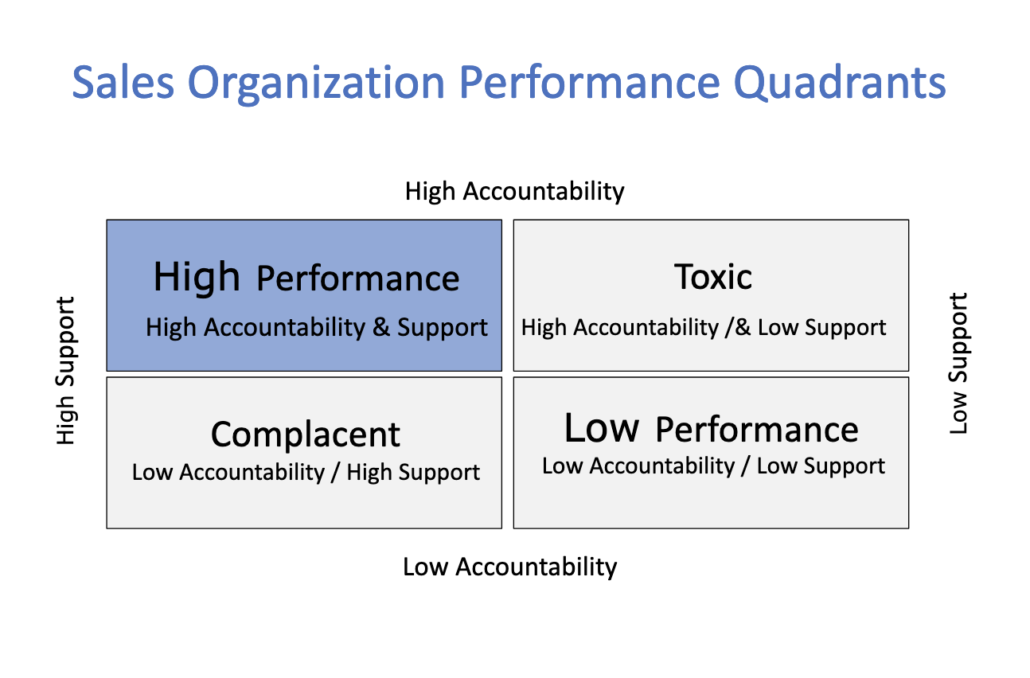How to Build a High Performing Sales Culture
Most sales leaders will tell you that they are committed to building high-performing sales cultures. However, only a minority achieve this goal. Why is that?
From my experience working with sales organizations over the past 34 years, the secret lies in achieving an often-illusive balance between the support you provide your salespeople and the level of accountability you enforce.
Defining Support:
- Provide the systems and processes necessary to measure and reinforce the
execution of your sales process - Design and align on a customized sales process for your selling environment emphasizing how to conduct effective selling conversations from greeting to close
- Training your sales process to ensure sales reps execute it with mastery
- Consistent, cadenced coaching conversations by sales managers to continuously improve selling skills and ensure daily execution of the sales process
- Consistent pipeline monitoring to review the volume, quality and continual movement of opportunities to closed sales
- Proactively and creatively incentivizing, rewarding and motivating at the level of individuals and teams
- Hiring only top talent by implementing a hiring process that includes objective sales specific assessments, behavioral interviewing, role plays and scenarios in interviews
- Designing and providing on boarding training that empowers strong performance
- Providing product training that empowers salespeople to showcase the value of your offerings
- Conducting sales team meetings that inspire, inform and train selling skills
- Uncovering and sharing best practices of top performers
Defining Accountability:
- Setting clear goals and expectations that are continuously and innovatively reinforced
- Providing the “why” for all expectations and tying them to company goals/mission/purpose/values
- Measuring performance – anything you expect you must inspect
- Following through to ensure effective engagement and execution
- Consistency in cadenced coaching conversations by sales managers – proactively scheduled
- Eliminating excuses, blaming lack of results on forces one cannot control. Instead, reinforcing accountability and responsibility by shifting focus on what one can control and change.
- Creating a learning environment where effort is reinforced, mistakes are seen as learning opportunities but lack of engagement/effort is not tolerated
- Enforcing consequences [sooner rather than later] for non-compliance, non-engagement, lack of effort, non-performance, missed goals, unwillingness to be coached.
Here is a helpful diagram to help you evaluate where your sales culture stands today.
Low Performance Culture
These sales cultures provide minimal training, on boarding, coaching and measure few activities. Also, they do not have a sales process and may even lack a CRM. As a result, they rarely achieve sales goals unless the product or service is selling itself.
Toxic Culture
These sales cultures provide minimal training, coaching, motivation, incentives, access to sales managers or selling tools. Instead, there is a strong and exclusive emphasis and high pressure on meeting sales activities goals and sales results with little assistance in knowing how to do it.
Complacent Culture
The complacent sales culture develops when sales leadership provides training, coaching, CRM, sales tools and sales meetings while providing incentives and rewards that are easy to achieve. Along with this, there are few consequences for non-performing salespeople. As a result, the sales team learns that failure to achieve goals is acceptable and normal.
High Performance Culture
These sales organizations learn to balance high levels of support with accountability. This requires leaders at the VP and Sales Manager level who are capable of hiring, coaching and motivating but also they are adept as initiating tough conversations and holding sales team members accountable for effectively executing the sales process, achieving activity and sales outcomes. They are not hesitant to replace non-performers after investing in training and coaching. They proactively and consistently have a strong bench strength of talent waiting to join their sales team.
Take a moment to honestly evaluate where your sales culture is today. What is out of balance? Are you providing enough support? If not, what needs to be changed or implemented? Are you providing accountability? Are your sales leaders capable of consistently holding their team accountable?
Most importantly, what does your sales organization need to implement or improve to start outperforming your competition and become a high performing sales organization?
Dr. John Musser is an organizational psychologist who has provided sales force evaluations, sales leadership training, sales process design, sales training and sales specific assessments for hiring and development for 34 years. His clients achieve high performing sales cultures who attract and retain strong sales talent at all levels of the sales organization.

